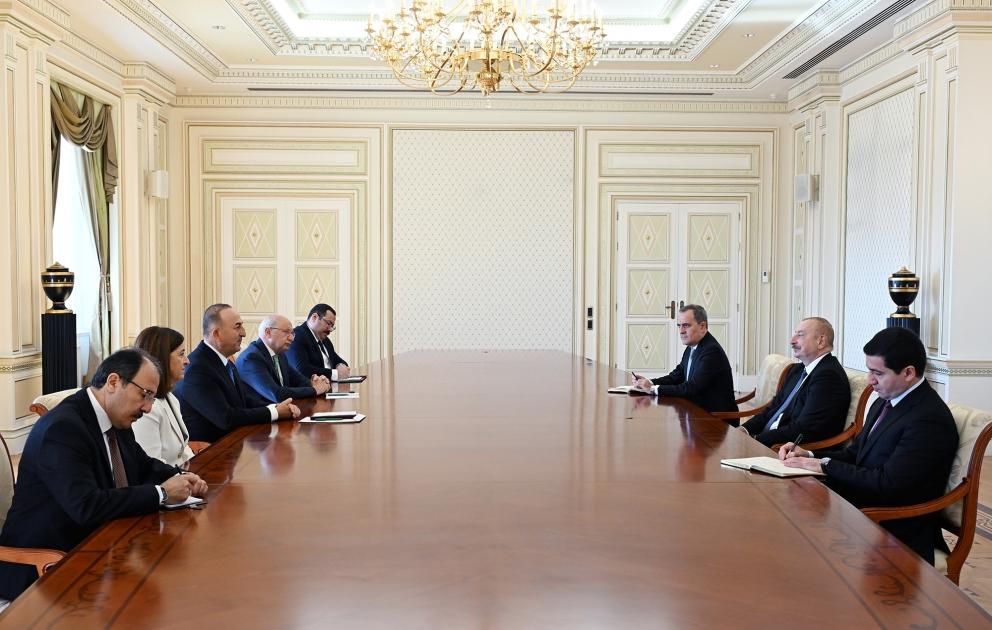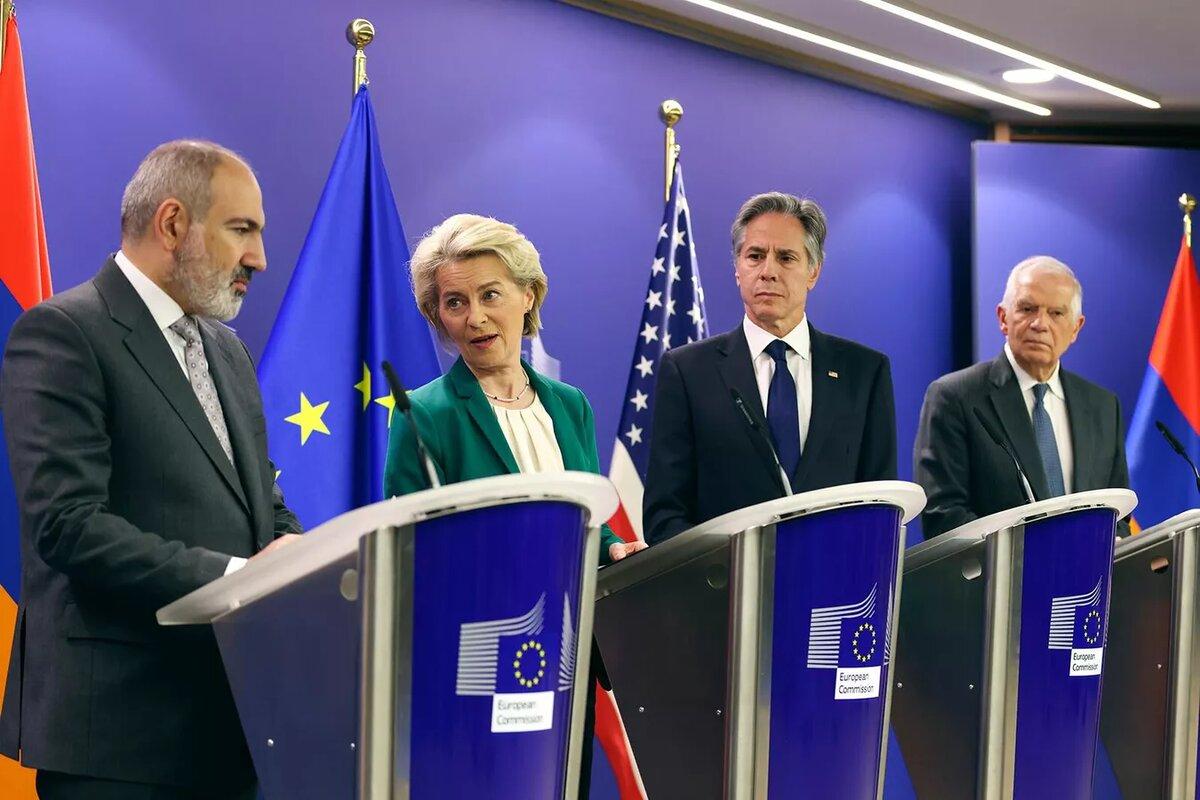Armenia's documentary enslavement Brussels. April 5, 2024
So, a meeting in the EU-US-Armenia format was held today, April 5, in Brussels, which, as Baku (and Ankara and Moscow) are convinced, creates another source of danger for the South Caucasus. And the fact that it was not postponed despite Azerbaijan's fair comments speaks volumes. Namely, that the West has actively joined the policy of creating dividing lines and, ultimately, tension in the South Caucasus.
Receiving today in Baku former Turkish Foreign Minister, MP of the Turkish Grand National Assembly and Head of the delegation to the NATO Parliamentary Assembly Mevlut Cavusoglu, Azerbaijani President Ilham Aliyev emphasized that current processes in the world, including in the South Caucasus, are developing in a very dangerous direction, and Azerbaijan rightly expresses its concern in this regard, as the plans outlined for the South Caucasus in the future may lead to a great catastrophe. Referring to the Brussels meeting between the United States, European Union and Armenia, the Azerbaijani leader noted that it creates another source of danger for the South Caucasus.
"Although, in recent days, high-ranking officials of both the United States and the European Union, during telephone conversations held at their initiative, have tried to convince us that this meeting is not directed against Azerbaijan. However, we know that it is directed against Azerbaijan and cooperation in the South Caucasus. It is aimed at creating dividing lines and isolating our country," President Ilham Aliyev emphasized.

It is hard not to agree with the arguments of the head of state, since recently, specifically since September last year, the EU through Borrell, the European Parliament, the Council of Europe and especially France have not given up their attempts to turn Armenia into an outpost in the South Caucasus. And this not only delays the negotiation process and pushes back the peace agreement, but also provokes Yerevan to new armed provocations. Armenia hopes that the West looming behind its back will be able to come to its aid and together they will be able to defeat Azerbaijan. And Yerevan is already taking steps in this direction. While Pashinyan was meeting with the powers that be in Brussels, from 15:10 to 17:35 Armenian Armed Forces units attempted to carry out engineering improvement works on the trench in front of the Azerbaijani army positions in the direction of the settlements of Gajaly, Aghbulag, Aghdam, Garalar and Kyokhne Gishlag of the Tovuz region, as well as Galakand of the Gedabey region in order to prepare the ground for further provocations.
"As a result of urgent measures taken by the units of the Azerbaijani army, the ongoing work was immediately stopped. In addition, at about 17:25, from positions located in Chinarli settlement of Berd district, positions of our army located in the direction of Munjuglu settlement of Tovuz district were subjected to small arms fire," the Azerbaijani Defense Ministry said.
Amazingly, however, Pashinyan cynically stated at a press conference before his meeting with Blinken and von der Leyen in Brussels that "we remain committed to normalizing relations with Azerbaijan on the basis of mutual recognition of each other's sovereignty and territorial integrity in accordance with the 1991 Almaty Declaration."
That is why, taking into account all of the above, we should say that the calls of Blinken (April 3) and von der Leyen (April 4) failed to convince the Azerbaijani side that their flirtations with Armenia and today's meeting are not directed against Azerbaijan. Yes, we admit that someone may object to us, but neither during Pashinian's public meeting with Blinken, von der Leyen and Borrell, nor in their comments did we see any military component. They seemed to talk about financial assistance and democratization of Armenia, but nobody said a word about military-technical cooperation. But let me tell you, the Non-Aggression Pact between Germany and the Soviet Union (also known as the Molotov-Ribbentrop Pact or the Stalin-Hitler Pact), an intergovernmental agreement signed on August 23, 1939 by the heads of the foreign affairs departments of Germany and the Soviet Union, did not differ in appearance from the same treaties signed by Berlin with London, Paris and Tallinn. But unlike them, the Molotov-Ribbentrop Pact also contained a secret additional protocol that defined the boundaries of the spheres of interest of the parties. Neither Berlin (before the attack on the USSR) nor Moscow spoke about it publicly.

So was in the case of the Brussels meeting - the parties spoke publicly about the economy, energy, trade and investment. But then negotiations took place behind closed doors. What on earth was so secretive there? Isn’t that what we already reported earlier? Namely, a pact on military cooperation and military assistance to Armenia from the US and the EU, including the transfer of advanced military technologies and weapons systems, an increase in the number of training programs for the Armenian military and joint exercises. In particular, as our reliable sources of information reported, to meet the military needs of Armenia, the EU undertakes to use the mechanism of the European Peace Facility. In the near future, we will definitely present our readers with information about what was signed today in Brussels and what they are so carefully trying to hide from the world. Everything has its time.
By the way, another important fact attracts attention. The joint press conference before the closed meeting between Pashinyan - Blinken - von der Leyen - Borrell was surprisingly dull, not as pompous as, apparently, originally planned. There was not even a hint of joy and celebration. Why? The answer is obvious - the reason for this was the decisive position of Azerbaijan, voiced at the highest level. Baku clearly - both before, during, and after Aliyev’s telephone conversations with Blinken and von der Leyen - showed that we must be taken into account. And, judging by the dull atmosphere at the press conference, our messages reached their recipients.
As for Armenia, today it formalized its betrayal. It received 270 million euros from the Europeans and 65 million dollars from the United States. The fact remains that Armenia is turning into a military outpost of the West in the South Caucasus. For 30 years it played the role of an outpost of Russia, and now it is changing its master. And this is a very dangerous game. First of all, for Armenia itself.








